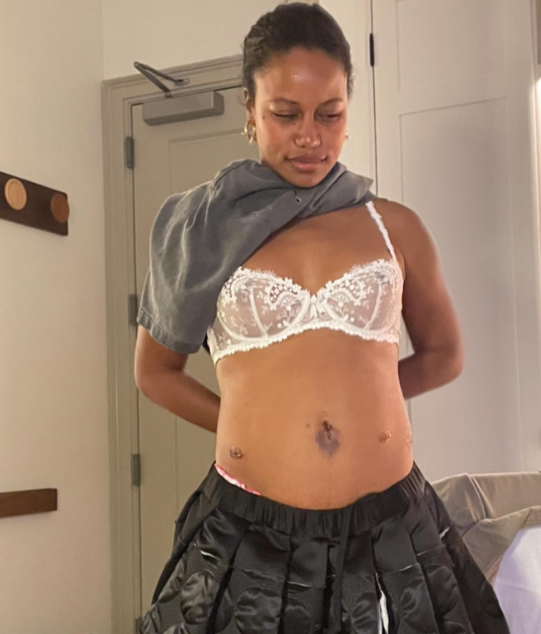
Taylour Paige-Angulo, actress of “Beverly Hills Cop: Axel F” and “Zola”, recently opened up about her 20-year struggle with endometriosis, a chronic and often debilitating condition affecting millions of women worldwide.
In a heartfelt Instagram post, Paige-Angulo shared the emotional and physical toll endometriosis had on her life, recalling how the pain would make her “see stars” and often left her vomiting, unable to drive, or ruining clothing due to heavy bleeding. After years of suffering and self-doubt, she finally underwent surgery in the fall of 2023, discovering extensive tissue growth on her colon, bladder, and rectum.
“The pain would make me see stars. Throwing up every month. Sometimes couldn’t drive,” Paige-Angulo wrote. “The worst is how much you gaslight yourself. It’s almost like there’s no way you’re hurting this much? it definitely psychologically does something to you because it’s like you and no one around you believes the pain you’re in. The anxiety of next month. So many times I’ve ruined a costume or a good pair of jeans. In highschool my khaki uniform skirts.
Her story sheds light on a condition that remains widely misunderstood, particularly among Black women, who often face delayed diagnoses due to medical bias, stigma, and systemic healthcare disparities. For those living with endometriosis, awareness and self-advocacy are crucial.
RELATED: 5 Concerns Black Women With Endometriosis Face – And What to Do!
Understanding Endometriosis
Endometriosis occurs when tissue similar to the uterine lining grows outside the uterus, often affecting the ovaries, fallopian tubes, and other organs. This misplaced tissue thickens, breaks down, and bleeds with each menstrual cycle, but since it has no way to exit the body, it can lead to inflammation, scarring, and painful adhesions.
Symptoms can include:
- Severe menstrual cramps
- Chronic pelvic pain
- Heavy or irregular periods
- Painful intercourse
- Digestive issues
- Infertility
- Fatigue and bloating
According to the Cleveland Clinic, endometriosis, which affects one in 10 women, can significantly impact daily life, making routine activities difficult. Many women with endometriosis report struggling with work, school, and relationships due to the unpredictable nature of their symptoms.
View this post on Instagram
The Challenges Black Women Face
Black women with endometriosis are often misdiagnosed or dismissed, with their pain not taken as seriously. Studies suggest that racial biases in medicine contribute to disparities in diagnosis and treatment. Additionally, conditions like fibroids, which disproportionately affect Black women, can overshadow or mask the presence of endometriosis, delaying proper care.
Another factor is the cultural stigma around discussing menstrual health. Many Black women grow up in communities where discussing period pain is minimized or considered a normal part of womanhood. This can lead to suffering in silence, delaying diagnosis and treatment.
“So many women are going THROUGH it okay. Be gentle with us. I am so grateful for what I’ve been able to turn around in myself over the last few years,” Paige-Angulo added.
The Importance of Early Diagnosis
Since endometriosis can lead to complications like infertility and organ damage, early diagnosis is crucial. Yet, studies show that many women wait an average of seven to ten years before receiving a correct diagnosis. Black women often wait even longer due to medical dismissal and lack of access to specialized care. If you experience symptoms, don’t hesitate to push for testing, such as ultrasounds, MRIs, or laparoscopic surgery, which is the gold standard for diagnosing endometriosis.

RELATED: Coping with Endometriosis: 7 Ways to Ease the Pain
Tips for Black Women Managing Endometriosis
- Advocate for Yourself
If you feel your pain is being ignored, seek a second opinion. Keep a symptom journal and be direct with healthcare providers about the severity of your symptoms. - Find a Specialist
Not all doctors are well-versed in endometriosis. Look for gynecologists or reproductive health specialists who have experience treating the condition. - Explore Treatment Options
Treatments range from pain management (NSAIDs, birth control) to more advanced options like hormone therapy and surgery. Speak with your doctor about the best plan for you. - Prioritize Nutrition & Lifestyle Changes
An anti-inflammatory diet rich in leafy greens, healthy fats, and lean proteins may help manage symptoms. Regular movement, such as yoga or gentle exercise, can also provide relief. - Build a Support System
Endometriosis can be isolating. Join online forums, advocacy groups, or social media communities where Black women share their experiences. - Mental Health Matters
Chronic pain can take a toll on mental health. Consider therapy, meditation, or practices that support emotional well-being. Speaking with a therapist who understands chronic illness can be invaluable. - Raise Awareness
Sharing stories, like Taylour Paige-Angulo’s, helps break the silence around endometriosis. The more people understand the condition, the better the support and treatment options will become. - Consider Holistic Therapies
Alternative treatments such as acupuncture, herbal supplements, and pelvic physical therapy have shown promise in helping some women manage their symptoms. - Track Your Cycle
Apps and journals can help you identify symptom patterns, which can be useful when discussing treatment options with your doctor.

A Message of Hope
Despite the struggles, Paige-Angulo remains hopeful, expressing gratitude for her support system and the small joys of life. Her journey serves as a powerful reminder that healing is possible, and no one should have to suffer in silence.
“I’m thankful for good bloodwork and new days. Sunshine. good walks. Jumping on my mini trampoline. it’s not just one thing it’s a whole lot of things & I’m thankful we live in a time we can share & help each other! A few bloated pics, some post surgery, childhood internalizing, a good read. I love you,” she wrote.
For Black women with endometriosis, the road to diagnosis and treatment may be challenging, but with advocacy, awareness, and community support, a better quality of life is within reach. By sharing experiences, pushing for medical justice, and supporting one another, we can work toward better recognition and treatment for this painful condition.









